Tamilnadu State Board New Syllabus Samacheer Kalvi 11th Maths Guide Pdf Chapter 9 Limits and Continuity Ex 9.5 Text Book Back Questions and Answers, Notes.
Tamilnadu Samacheer Kalvi 11th Maths Solutions Chapter 9 Limits and Continuity Ex 9.5
Question 1.
Prove that f(x) = 2x2 +3x – 5 is continuous at all points in R.
Answer:
f(x) = 2x2 + 3x – 5
Clearly f(x) is defined for all points of R.
Let x0 be an arbitrary point in R. Then
f(x0) = 2x02 + 3x0 – 5 ——- (1)
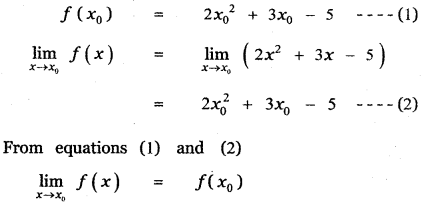
Thus, f(x) is defined at all points of R limit of f(x) exist at all points of R and is equal to the value of the function f (x).
Thus f (x) is continuous at all points of R.
![]()
Question 2.
Examine the continuity of the following
(i) x + sin x
Answer:
Let f(x) = sin x
f (x) is defined at all points of R.
Let x0 be an arbitrary point in R.
![]()
= xo + sin x0 …….. (1)
f (xo) = xo + sin xo ……… (2)
From equations (1) and (2) we get
![]()
∴ At all points of R, the limit of f (x) exists and is equal to the value of the function.
Thus, f( x) satisfies ail conditions for continuity.
Therefore, f(x) is continuous at all points of f(x).
(ii) X2 cos x
Answer:
Let f(x) = x2 cos x
f (x) is defined at all points of R.
Let x0 be an arbitrary point in R. Then
![]()
= x20 cos 0
f(x0) = x20 cos 0
From equation (1) and (2), we have
![]()
∴ The limit at x = x0 exist and is equal to the value of the function f(x) at x = x0.
Since x0 is arbitrary, the limit of the function exist and is equal to the value of the function for all points in R.
∴ f( x) satisfies all conditions for continuity. Hence
f (x) is a continuous function in R.
![]()
(iii) ex tan x
Answer:
Let f(x) = ex tan x
f (x) is defined at ail points of R.
except at (2n + 1)\(\frac{\pi}{2}\), n ∈ Z.
Let x0 be an arbitrary point in R – (2n + 1)\(\frac{\pi}{2}\), n ∈ Z
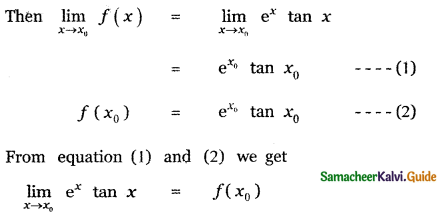
∴ Limit at x = x0 exist and is equal to the value of the function f(x) at x = x0.
Since x0 is arbitrary the limit of the function. f(x) exists at all points in R – (2n + 1)\(\frac{\pi}{2}\), n ∈ Z and is equal to the value of the function f (x) at that points.
∴ f (x) satisfies all conditions for continuity. Hence,
f(x) is continuous at all points of R – (2n + 1)\(\frac{\pi}{2}\), n ∈ Z
(iv) e2x + x2
Answer:
Let f(x) = e2x + x2
Clearly, f(x) is defined for all points in R.
Let x0 be an arbitrary point in R.

From equations (1) and (2) we have,
The limit of the function f(x) exist at x = x0 and is equal to the value of the function f(x) at x – x0.
Since x0 is an arbitrary point in R, the above is true for all points in R. Hence f (x) satisfies all conditions for continuity. Hence f (x) is continuous at all points of R.
![]()
(v) x . log x
Answer:
Let f(x) = x log x
The function f(x) is defined in the open interval (0 , ∞) since log x is defined for x > 0. Let x0 be an arbitrary point in (0, ∞). Then
![]()
= x0 log x0
f(x0) = x0 log x0
From equation (1) and (2) we have
![]()
∴ The limit of the function f(x) exists at x = x0 and is equal to the value of the function .
Since x0 is an arbitrary point the above is true for all points in (0, ∞).
∴ f(x) is continuous at all points of (0, ∞).
(vi) \(\frac{\sin x}{x^{2}}\)
Answer:
f(x) = \(\frac{\sin x}{x^{2}}\)
f(x) is not defined at x = 0
∴ f(x) is defined for all points of R – {0}
Let x0 be an arbitrary point in R – {0}. Then
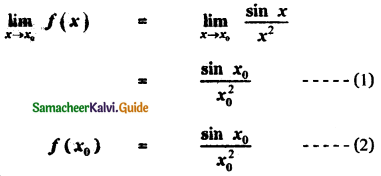
From equation (1) and (2) we have
![]()
∴ The limit of the function f(x) exist at x = x0 and is equal to the value of the function f(x) at x = x0.
Since x0 is an arbitrary point in R – {0}, the above result is true for all points in R – {0}.
∴ f(x) is continuous at all points of R – {0}.
![]()
(vii) \(\frac{x^{2}-16}{x+4}\)
Answer:
Let f(x) = \(\frac{x^{2}-16}{x+4}\)
f(x) is not defined at x = – 4
∴ f(x) is defined for all points of R – {- 4}.
Let x0 be an arbitrary point in R – {- 4}. Then
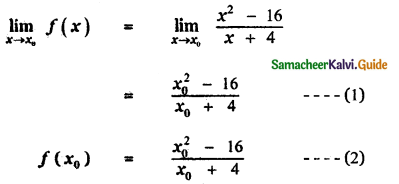
From equation (1) and (2) we have
![]()
Thus the limit of the function f (x) exist at x = x0 and is equal to the value of the function f (x) at x = x0.
Since x0 is an arbitrary point in R – {- 4} the above result is true for all points in R – { – 4}.
∴ f(x) is continuous at all points of R – {- 4}.
(viii) |x + 2| + |x – 1|
Answer:
let f(x) = |x + 2| + |x – 1|
f( x) is defined for all points of R. Let x0 be an arbitrary point in R. Then

From equation (1) and (2) we get
![]()
Thus the limit of the function f(x) exist at x = x0 and is equal to the value of the function at x = x0. Since x = x0 is an arbitrary point in R, the above
result is true for all points in R. Hence f (x) is continuous at all points of R.
(ix) \(\frac{|x-2|}{|x+1|}\)
Answer:
Let f(x) = \(\frac{|x-2|}{|x+1|}\)
f(x) is defined for all points of R except at x = – 1.
∴ f (x) is defined for all points of R – { – 1 }.
Let x0 be an arbitrary point in R – {- 1}.Then

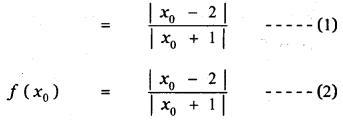
From equation (1) and (2) we have
![]()
Hence the limit of the function f(x) at x = x0 exists and is equal to the value of the function at x = x0.
Since x = x0 is an arbitrary point in R – { – 1 }, the above result is true for all points in R – {- 1).
∴ f(x) is continuous at all points of R – {- 1}.
![]()
(x) cot x + tan x
Answer:
Let f(x) = cot x + tan x
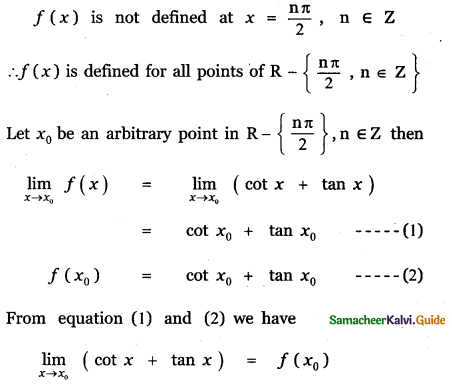
∴ The limit of the function f(x) exists at x = x0 and is equal to the value of the function f (x) at x = x0.
Since x0 is an arbitrary point , the above result is true for all points of R – \(\left\{\frac{\mathrm{n} \pi}{2}\right\}\), n ∈ z.
∴ f(x) is continuous at all points of R – \(\left\{\frac{\mathrm{n} \pi}{2}\right\}\), n ∈ Z
Question 3.
Find the points of discontinuity of the function f, where
(i) 
Answer:
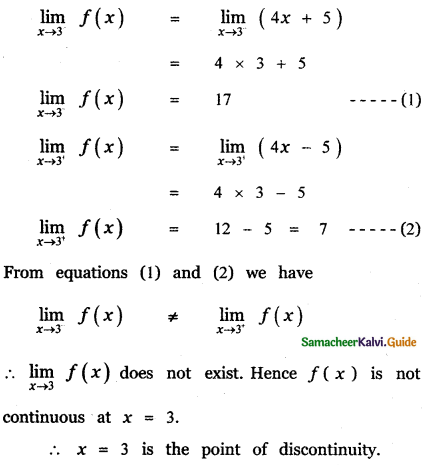
![]()
(ii) 
Answer:
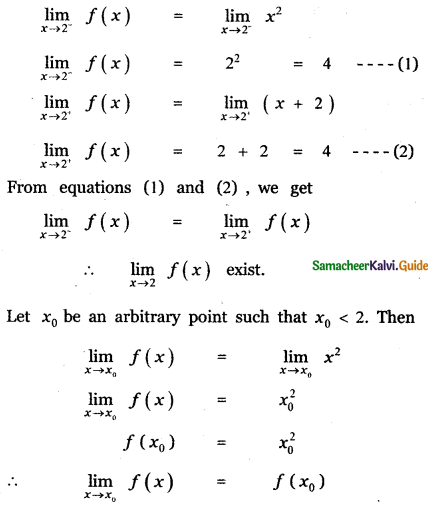
For the point x0 < 2, we have the limit of the function that exists and is equal to the value of the function at that point.
Since x0 is an arbitrary point the above result is true for all x < 2.
∴ f(x) is continuous in (-∞, 2).
Let x0 be an arbitrary point such that x0 > 2 then
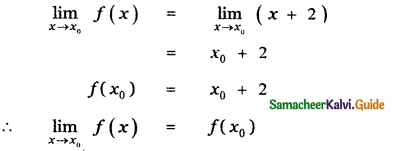
∴ For the point x0 > 2, the limit of the function exists and is equal to the value of the function.
Since x0 is an arbitrary point the above result is true for all x > 2.
∴ The function is continuous at all points of (2, ∞). Hence the given function is continuous at all points of R.
![]()
(iii) 
Answer:
Clearly, the given function is defined at all points of R.
Case (i) At x = 2
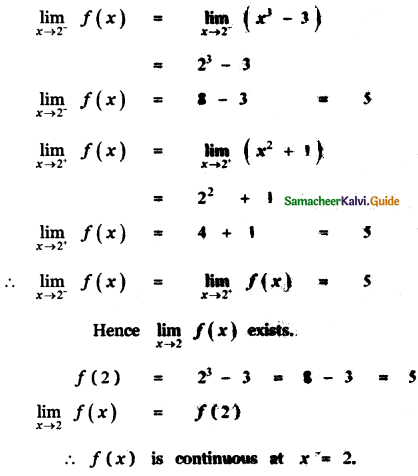
Case (ii) for x < 2
Let x0 be an arbitrary point in (- ∞, 2).
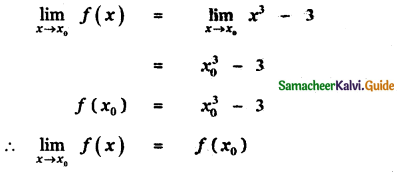
∴ f(x)is continuous at x = x0 in (- ∞, 2).
Since x0 is an arbitrary point in (- ∞, 2), f(x) is continuous at all points. f(-∞, 2).
![]()
Case (iii) for x > 2
Let y0 be an arbitrary point in (2, ∞). Then
![]()
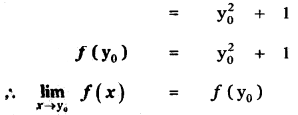
Hence, f(x) is continuous at x = y0 in (2, ∞).
Since yo is an arbitrary point of (2, ∞), f (x) is continuous at all points of (2, ∞).
∴ By case (i) case (ii) and case (iii) f(x) is continuous at all points of R.
(iv) 
Answer:
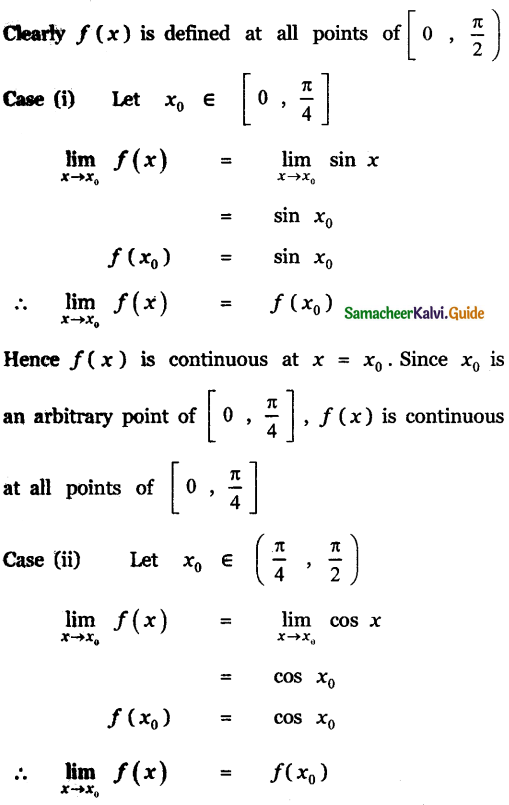
Hence, f (x) is continuous at x = x0. Since x0 is an arbitrary point of \(\left(\frac{\pi}{4}, \frac{\pi}{2}\right)\), f(x) is continuous at all points of \(\left(\frac{\pi}{4}, \frac{\pi}{2}\right)\).
Hence, f (x) is continuous at all points \(\left[0, \frac{\pi}{2}\right)\),
![]()
Question 4.
At the given point x0 discover whether the given function is continuous or discontinuous citing the reasons for your answer
(i) 
Answer:
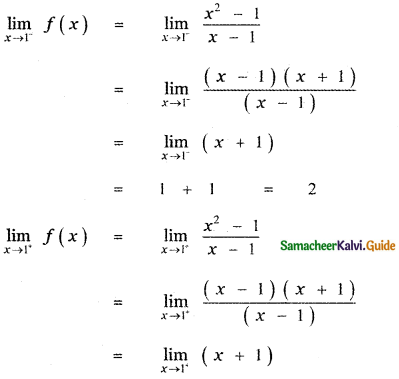
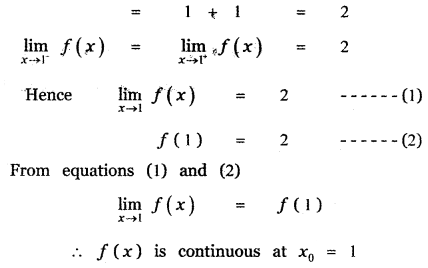
![]()
(ii) 
Answer:
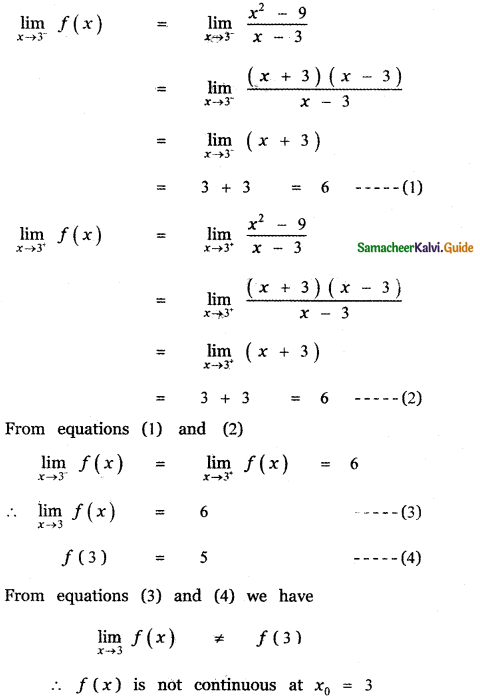
![]()
Question 5.
Show that the function

Answer:

Clearly, the given function f(x) is defined at all points of R.
Case (i) Let x0 ∈ (- ∞, 1) then
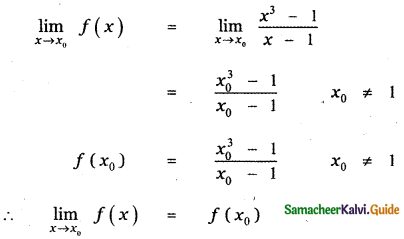
f (x) is continuous at x = x0.
Since x0 is arbitrary f(x) is continuous at all points of (-∞, 1).
Case (ii) Let x0 ∈ (1, ∞) then
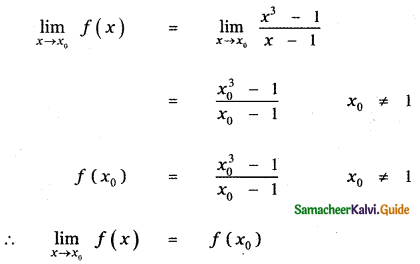
f (x) is continuous at x = x0.
Since x0 is an arbitrary point of (1, ∞), f(x) is continuous at all points of (1, ∞).
Case (iii) Let x0 = 1 then

Hence, f (x) is continuous at x = 1.
Using all the three cases, we have f (x) is continuous at all the points of R.
![]()
Question 6.

Answer:
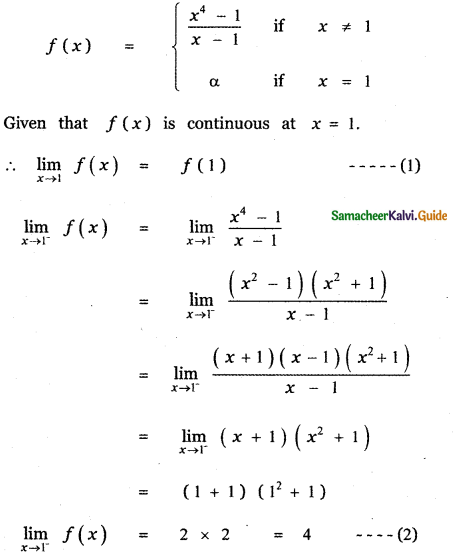
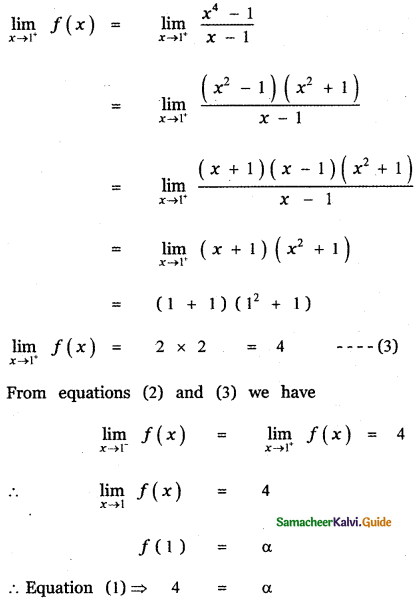
![]()
Question 7.

Graph the function. Show that f(x) continuous on (- ∞, ∞)
Answer:
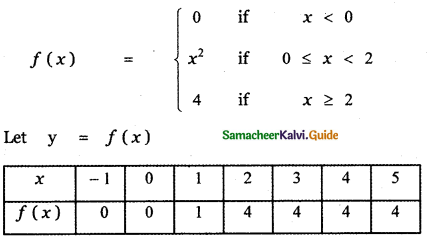
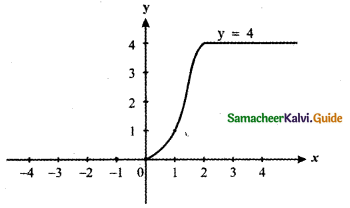
When x < 0 We have y = 0
When 0 ≤ x < 2 We have y = x2
When x ≥ 2 We have y = 4
Case (i) If x < 0 ie. (-∞, 0) then f (x) = 0
which is clearly continuous in (-∞, 0).
Case (ii) If 0 ≤ x < 2 je. [0 , 2)
Let x0 be an arbitrary point in [0, 2)

Hence f(x) is continuous at x = x0. Since x = x0 is an arbitrary f(x) is continuous at all points of [0, 2).
Case (iii) x ≥ 2 je. [2, ∞)
f( x) = 4 which is clearly continuous in [2 , ∞)
Case (iv) at x = 2,
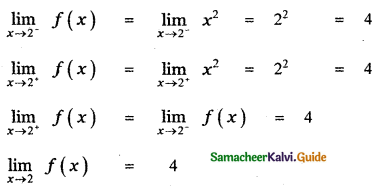
f(2) = 4
∴ f(x) is continuous at x = 2.
∴ Using case (j) case (ii) case (iii) and case (iv) we have f(x) is continuous at all points of R.
![]()
Question 8.
If f and g are continuous functions with f(3) = 5 and ![]() [2f(x) – g(x)] = 4, find g(3)
[2f(x) – g(x)] = 4, find g(3)
Answer:
Given f and g are continuous functions.
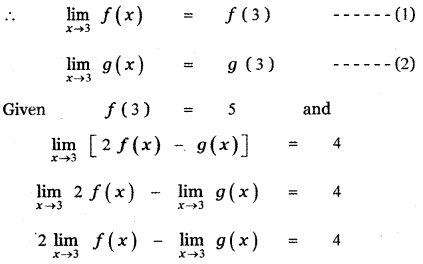
2 f(3) – g(3) = 4
2 × 5 – g(3) = 4
10 – 4 = g(3)
g(3) = 6
Question 9.
Find the points at which f is discontinuous. At which of these points f is continuous from the right, from the left, or neither? Sketch the graph of f.
(i) 
Answer:
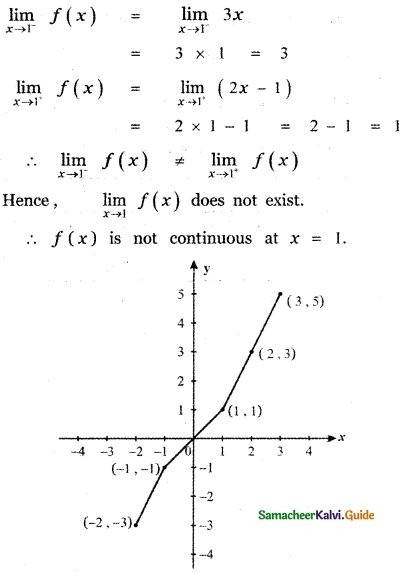

![]()
(ii) 
Answer:
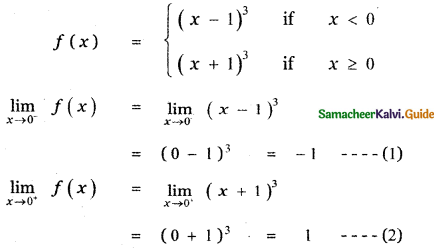
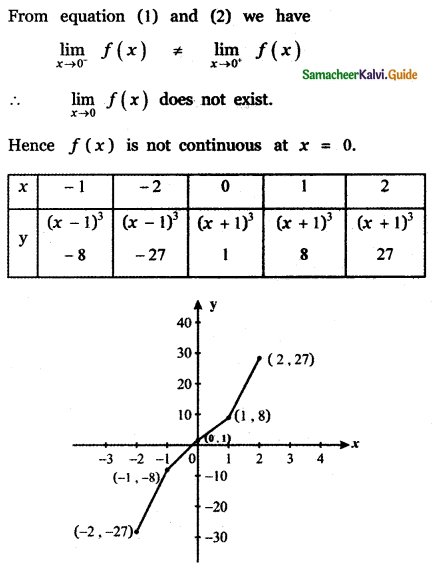
Question 10.
A function f is defined as follows:
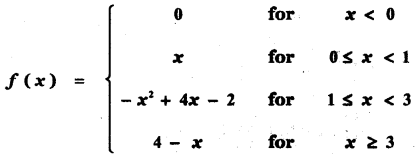
is the function continuous?
Answer:
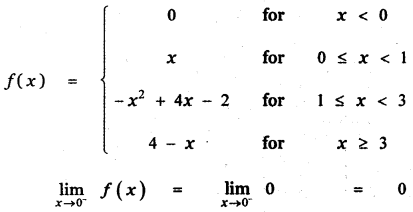
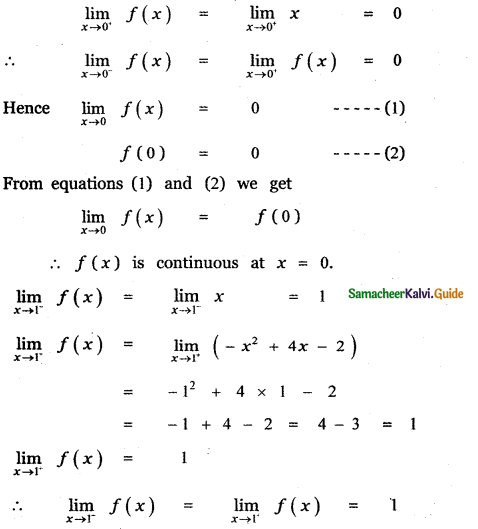
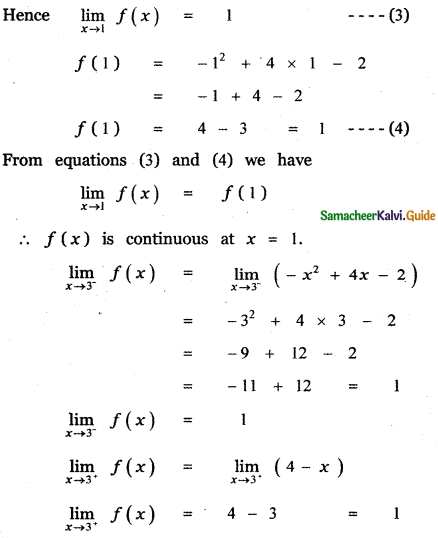
![]()
Question 11.
Which of the following functions f has a removable discontinuity at x = x0? If the discontinuity is removable, find a function g that agrees with f for x ≠ x0 and is continuous on R
(i) ![]()
Answer:
f(x) is not defined at x = -2
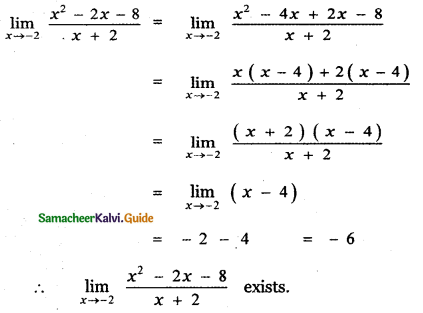
Redefine the function f(x) as

∴ f (x) has a removable discontinuity at x = -2.
Clearly, g (x) is continuous on R.
(ii) 
Answer:
The function f(x) is not defined at x = -4.
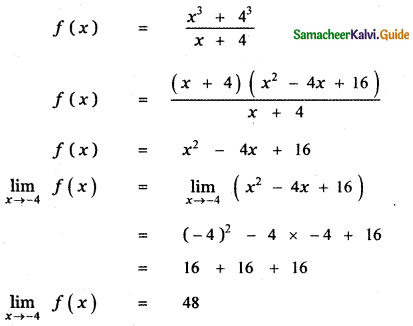
Limit the function f (x) exist at x = -4.
∴ The function f (x) has a removable discontinuity at x = -4.
Redefine the function f (x) as

Clearly, the function g(x) is continuous on R.
(iii) 
The function f(x) is not defined at x = 9.

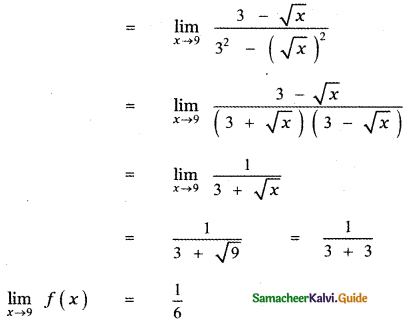
∴ Limit of the function f(x) exists at x = 9.
Hence, the function f(x) has a removable discontinuity at x = 9. Redefine the function f(x) as
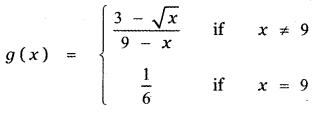
Clearly, g (x) is defined at all points of R and is continuous on R.
![]()
Question 12.
Find the constant b that makes g continuous on (-∞, ∞).

Answer:

Given g is continuous on R.
∴ g (x) is continuous at x = 4.

42 – b2 = b × 4 + 20
16 – b2 = 4b + 20
b2 + 4b + 20 – 16 = 0
b2 + 4b + 4 = 0
(b + 2)2 = 0
b + 2 = 0 ⇒ b = -2
Question 13.
Consider the function f (x) = x sin \(\frac{\pi}{x}\) What value must we give f (0) in order to make the function continuous everywhere?
Answer:
f(x) = x sin \(\frac{\pi}{x}\)
Define f(x) on R as

∴ f(0) = 0. Then f(x) is continuous on R.
![]()
Question 14.
The function f(x) = \(\frac{x^{2}-1}{x^{3}-1}\) is not defined at x = 1. What value must we give f(1) in order to make f(x) continuous at x = 1 ?
Answer:
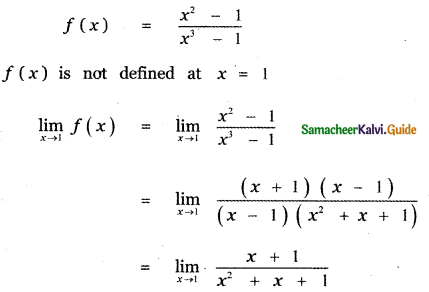

The function f (x) has a removable discontinuity at x = 1. Redefine f (x) as

∴ f(1) = \(\frac{2}{3}\). Then f(x) will be continuous at x = 1
Question 15.
State how continuity is destroyed at x = x0 for each of the following graphs.
Answer:
(a) 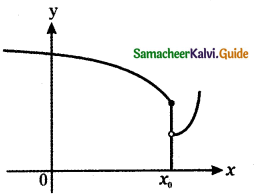
The left – hand limit and right hand limit does not coincide at x = x0
(b) 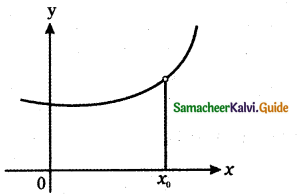
The function f(x) is not defined at x = x0 and hence the continuity is destroyed at x = x0
(c) 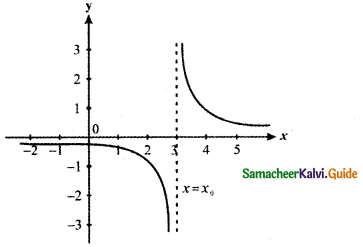
The limit of f(x) does not exist at x = x0
![]()
(d) 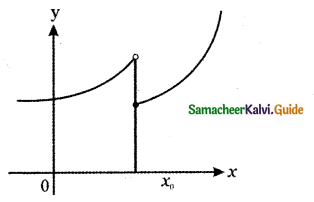
The left hand limit and right – hand limit does not coincide at x = x0